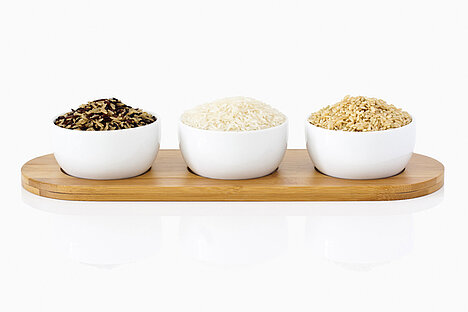Rice protein

Rice protein is a vegetable protein obtained from rice grains. It is an alternative to animal protein sources such as meat or dairy products and can be suitable for dogs with allergies or intolerances. In this article, you'll find out what rice protein is for dogs, what its benefits and disadvantages are and how you can feed it to your dog.
What is rice protein for dogs?
Rice protein is a powder made from rice grains. The carbohydrates and fats are separated from the protein and the protein is concentrated. Rice protein contains all the essential amino acids that dogs cannot produce themselves and must ingest with their food. Amino acids are the building blocks for proteins, which are required for many important functions in the body, such as the development of muscles, skin, hair, hormones and enzymes.
Rice protein has a high biological value, which means that it can be easily utilized by the body. It is also easy to digest and has a neutral taste. Rice protein can be used as a supplement to dog food or as the main ingredient in special diet foods.
What are the benefits of rice protein for dogs?
Rice protein has several benefits for dogs that you should be aware of:
- Rice protein is hypoallergenic, which means it rarely triggers allergic reactions. This is because it does not contain gluten, which can lead to intolerances in some dogs. It is also a plant-based protein source, which has less allergenic potential than animal protein sources such as beef, pork or poultry.
- Rice protein is low in fat and calories, which can be beneficial for dogs with obesity or diabetes. It still provides sufficient energy and nutrients for the dog.
- Rice protein is rich in fiber, which can aid digestion and regulate blood sugar levels. Fiber can also help keep your dog full longer and prevent cravings.
- Rice protein is rich in antioxidants that can protect the body from free radicals. Free radicals are harmful molecules that are produced by environmental factors or metabolic processes and can cause cell damage. Antioxidants can strengthen the body's defenses and inhibit inflammation.
What are the disadvantages of rice protein for dogs?
Rice protein also has some disadvantages for dogs that you should not ignore:
- Rice protein is not as high quality as animal protein, as it contains fewer essential amino acids. This means that the dog has to eat more of it to meet its needs. In addition, too much vegetable protein can lead to acidification of the body, which alters the pH of the blood and can cause health problems.
- Rice protein can contain traces of harmful substances that can enter the product during production or cultivation. These include pesticides, heavy metals or arsenic. These substances can accumulate in the body and be harmful in the long term.
- Rice protein can affect the taste of the food or cause unpleasant odors. This can lead to the dog rejecting the food or having a reduced appetite.
How do I feed rice protein to my dog?
If you want to feed your dog rice protein, you should bear a few points in mind:
- Rice protein is not a complete food, but only a supplement or an ingredient in special diet foods. You should therefore always make sure that your dog receives a balanced and varied diet that also contains other sources of protein, carbohydrates, fats, vitamins and minerals.
- Rice protein should always be fed in moderation to avoid oversupply or deficiency. The exact amount depends on your dog's size, weight, age and activity level. You can follow the manufacturer's feeding recommendations or ask a vet for advice.
- Rice protein should always be offered with sufficient water to aid digestion and prevent dehydration. This is especially true for dry food with rice protein, which binds a lot of liquid.
- Rice protein should always be of high quality and come from controlled cultivation. You should make sure that the product does not contain any additives such as colorants, flavorings or preservatives and that it contains as few harmful substances as possible. You can look for quality seals such as organic or eco or rely on trustworthy manufacturers.
Rice protein for dogs is an interesting option for sensitive dogs or dogs with special dietary needs. It has some advantages, but also some disadvantages that you should consider. If you want to feed your dog rice protein, you should always inform yourself well and follow the feeding recommendations.
If you notice any signs of hypersensitivity or poisoning in your dog, you should see your vet immediately. We are not a substitute for a vet, but we try to be as accurate as possible. Every dog reacts differently and we recommend you get a second opinion or consult your vet if in doubt.
Stay healthy and take good care of your four-legged friend!😊